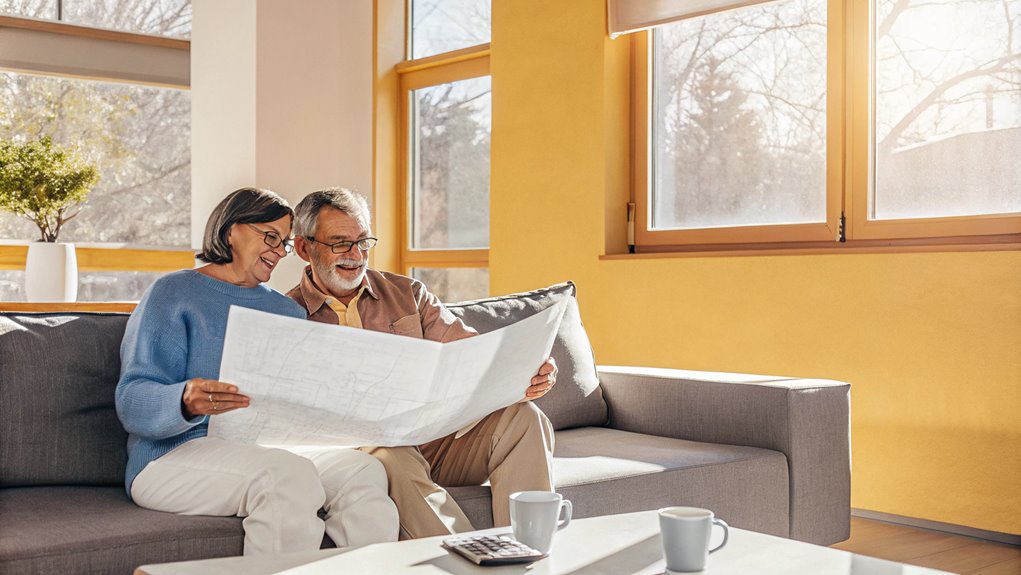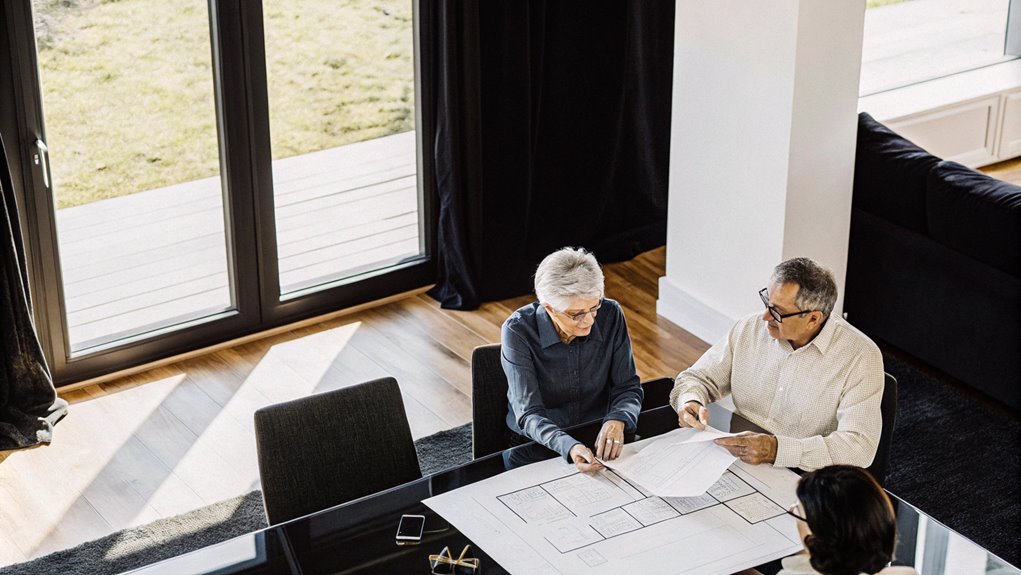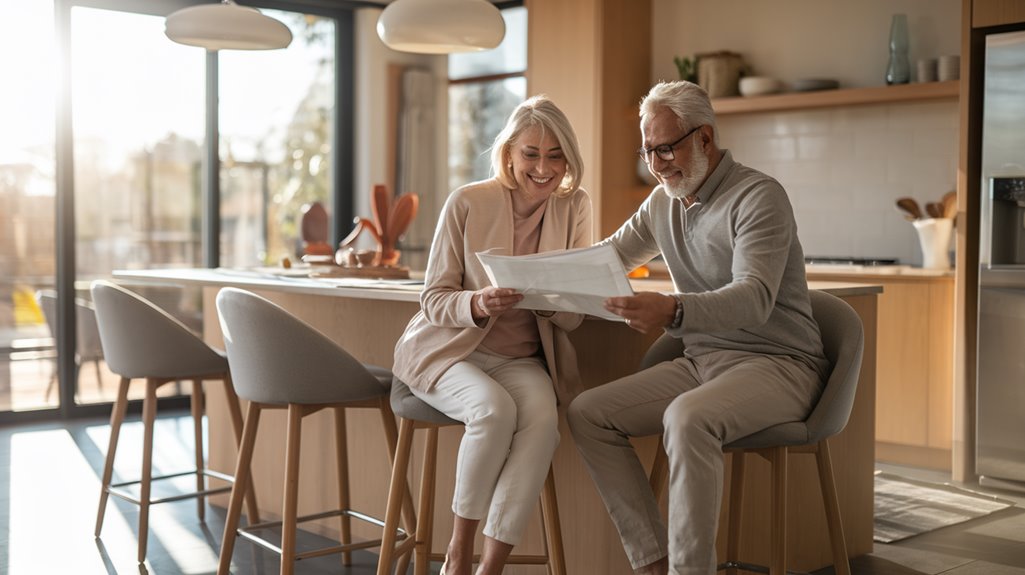Think of your home like a piggy bank for when you stop working. Each time you pay your monthly bill, you own more of your home. As your home grows in value, your piggy bank gets bigger too.
When you need money later in life, you can use what you've saved in your home. You can get this money in a few ways. You can take out a loan based on how much of your home you own. Or, if you are 62 years old, you can get special loans made just for older folks.
You might also choose to sell your big home and move to a smaller one. This lets you keep the extra money for your needs.
The key is to think about these choices now. That way, you'll have more money when you need it most.
Understanding Your Home's Hidden Value

Your home has a secret wallet inside it called equity. Think of equity as the money that's really yours in your home. It's like a piggy bank that grows in two ways: when you pay your house bills and when your home becomes worth more money.
Let's say your home is worth $200,000 and you owe the bank $150,000. That means you have $50,000 in equity – that's your money!
As time goes by, your equity gets bigger. You can use this money when you get older and want to stop working. You can ask the bank to let you use some of this money. Many people use it to help them live better after they stop working.
Just like saving money in a bank, your home's equity is a way to save for when you're older. The more you know about your equity, the better choices you can make about using it.
Common Home Equity Access Methods
Your home is like a piggy bank. As you pay your mortgage, you save up money in your home. When you need this money, you have three ways to get it.
The first way is a home loan. You get all the money at once. You pay the same amount back each month, which makes it easy to plan ahead.
The second way is like having a credit card for your home. You can take money when you need it and pay it back over time. This gives you more control over how much you use.
The third way is to get a brand new mortgage. The new mortgage is bigger than your old one. You get to keep the extra money to use how you want.
Each way to get your home money is good for different things. Pick the one that works best for what you need to do.
Reverse Mortgages Explained

If you own your home and are 62 or older, you can turn your house into money you can spend. This is called a reverse mortgage.
You can get the money every month or all at once. The bank looks at how old you're and what your house is worth to decide how much money you can get.
You must live in the house and keep it in good shape. Many older people use this to help pay for things they need.
Accessing Your Home's Value
Your home has value you can use when you're 62 or older. A reverse mortgage lets you get money from your home while you still live in it. You don't have to sell it or make payments each month. You can get the money all at once, month by month, or when you need it.
You keep your house and only pay back the loan when you move out, sell, or die. To get this loan, you must take good care of your home. You also need to pay your taxes and keep insurance on the house.
How much money you can get depends on:
- How old you are
- What your home is worth
- What loan rates are right now
Most people get FHA reverse mortgages. These are safe because the government backs them. If you have a spouse, they can stay in the home after you die if their name is on the loan or if they qualify to stay.
Monthly Income vs. Lump-sum
Getting money from your home through a reverse mortgage gives you two choices – you can get small monthly payments or one big payment.
Monthly payments work like a paycheck. The money comes to you each month, just like Social Security. This makes it easy to pay your bills and know how much you can spend.
Getting all the money at once can help if you need to fix your house or pay big doctor bills right away. But you must be careful not to spend it too fast.
Most money helpers say monthly payments are better because they last longer and keep you from spending too much at once.
Key Eligibility Requirements
Want to get a reverse mortgage? Here's what you need:
First, you must be at least 62 years old. If you have a wife or husband, they need to be 62 too.
You must live in the home most of the time – at least half the year. It needs to be your main home.
You should own your home fully. If not, you need to have paid off most of it – about half.
Your home must be:
- A house for one family
- A condo that FHA says is okay
- A mobile home that meets special rules
You must:
- Pay your tax bills on time
- Keep home insurance
- Take good care of your home
Before you can get the loan, you need to take a class. This class helps you learn about reverse mortgages and what you need to do.
HELOC Vs Cash-Out Refinancing
When you own a home, you might need extra money. You can get this money in two ways from your home.
One way is called a HELOC. Think of it like a credit card tied to your home. You can take money when you need it. The amount you pay back changes over time. You keep your old home loan the same.
The other way is cash-out refinancing. This means you get a new, bigger home loan. You get extra money all at once. Your monthly payment stays the same each time. This often costs more to set up than a HELOC.
Pick what works best for you. Want to take money little by little? Get a HELOC. Want all your money at once with the same payment each month? Pick cash-out refinancing.
Strategic Downsizing for Retirement

Thinking about moving to a smaller home when you retire? Good timing can help you get more money from your house sale.
Look at what homes are selling for in your area. Pick a time when buyers really want houses.
A smaller home costs less to take care of each month. Plus, you can use the extra money from selling your bigger house to help pay for your retirement years.
The best part? A smaller home means less work and more time to enjoy life.
Timing Your Home Sale
Selling your home at the right time can help you get the best price. Think of it like picking the perfect day for a yard sale – you want lots of people to show up!
Keep an eye on what homes in your area are selling for. Some months are better for selling than others. Spring and summer often bring more buyers.
Watch what's being built near you. New stores or parks can make your home worth more money. When banks charge less to borrow money, more people can buy homes.
Think about when you want to stop working. Will you need to move to a smaller home? Will you move to be near family? These things matter when picking when to sell.
Also think about how selling will affect what you owe in taxes. Selling in one year versus another can make a big difference.
Don't rush to sell your home. Take your time to find the right moment. But don't wait too long – the best time to sell might pass you by.
Smaller Space, Bigger Returns
Moving to a smaller home helps you save money for when you stop working. You'll pay less for power, fixing things, and taxes. Many people who retire sell their big house and move to one that's much smaller. This gives them lots of extra money.
When you pick a smaller home, think about what makes you happy. Many people like homes that are easy to take care of, like condos. Some pick houses with no stairs.
Try to find a place near fun things to do, like parks with walking paths. You might want to move to a town where homes cost less. This way, your money goes further and you can do more things you enjoy.
Tax Implications of Equity Release
When you want to use your home's value to help with retirement, you need to know about taxes.
Let's talk about what happens when you borrow money from your house.
If you get a home loan, you don't pay taxes on the money you get. But you can only cut your taxes if you use the money to make your home better.
A reverse mortgage is like getting a loan that you don't pay back until later. You don't pay taxes on this money.
If you get a new, bigger mortgage to get cash, it might change how much you can take off your taxes.
If you sell your home, you might need to pay taxes if you make a lot of money from the sale.
If you rent out part of your home, you must pay taxes on the rent money you get. But you might be able to pay less in taxes for some things you spend on the rental.
Talk to someone who knows about taxes before you make any big choices.
Tax rules change a lot, and it's good to get help to make smart choices about your home's money.
Risks and Market Considerations

Your home's value can go up and down like a seesaw. This can make it tricky to use your house money for your later years.
Think of it like a piggy bank that changes size – sometimes it gets bigger, but it can also get smaller when you need it most.
When you own a home, you have to pay taxes and fix things that break. These costs can take a big bite out of your savings.
This is hard when you're not working anymore and have less money coming in.
If you want to move to a smaller home, you need to pick the right time.
It's like trying to sell your toys – sometimes lots of people want to buy them, and sometimes they don't. Your house is worth more when more people want to live in your area.
Planning the Right Timing
When to Use Your Home's Value
Think about using your home's money at the right time. Start planning about 3-5 years before you stop working. It's best to look at your choices while you still have a job. This helps you get better deals.
Look at these things first:
- How much you still owe on your home
- When you want to stop working
- How much money you'll need
- If you can take care of your home as you get older
- What you want to leave for your family
When you pick the right time to use your home's money, you can have more peace of mind.
You'll also have more ways to pay for what you need when you stop working.
Creating Your Home Equity Strategy

Your home is more than walls and a roof – it's money you can use when you retire.
Let's look at ways to use this money wisely. You can borrow money from your home, get a special loan called a reverse mortgage, or move to a smaller home. Each way has good points and things to think about.
First, find out how much your home is worth after paying what you owe.
Think about how much money you'll need when you stop working. Your age and health matter too.
If you want to stay in your home, you might like a reverse mortgage. If you're OK with moving, you could sell your home and buy a cheaper one. This gives you extra money and cuts down on home costs.







